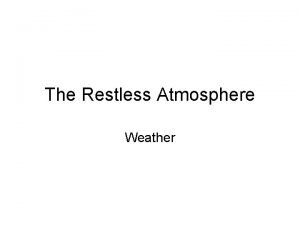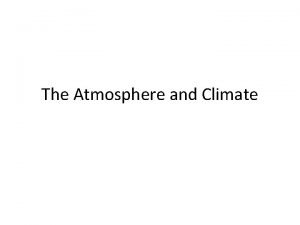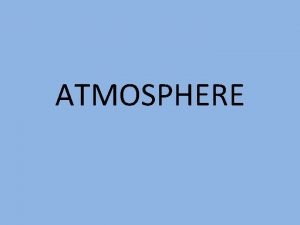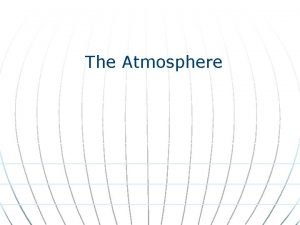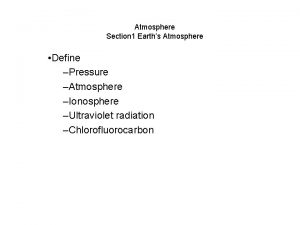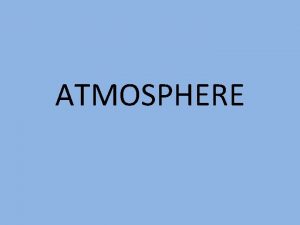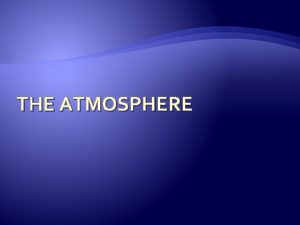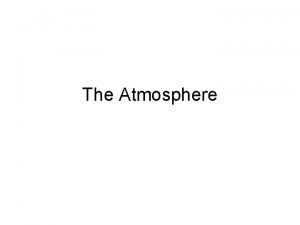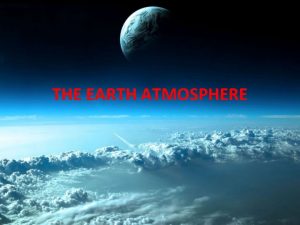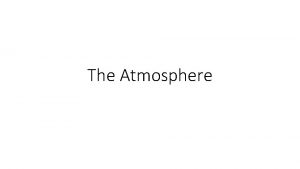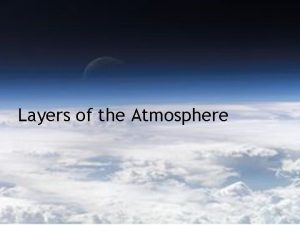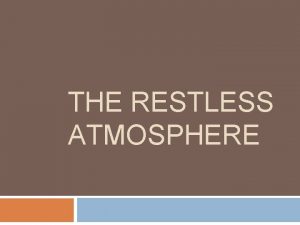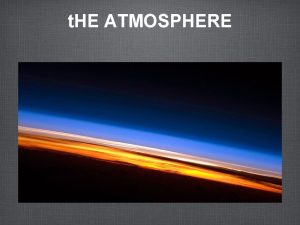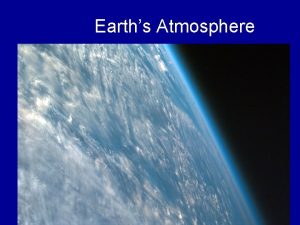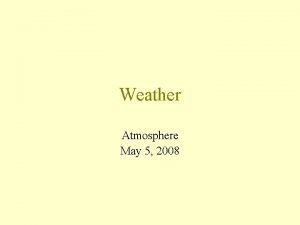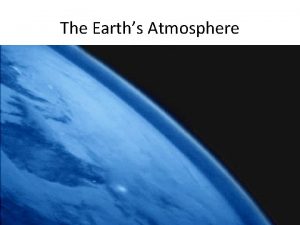The Atmosphere What is the atmosphere The atmosphere
























- Slides: 24

The Atmosphere

What is the atmosphere? § The atmosphere is a mixture of gasses that surround the earth. § It holds the oxygen you breathe and protects you from the sun’s radiation. § It also helps keep us warm.

How does it work?

Composition § § § 78% nitrogen (N) 21% oxygen (O) 1% small particles of dust, ash, sea salt, dirt, and smoke

Water § Water can be found in the atmosphere as: – Liquid – Solid – Gas

Air Pressure § Air pressure is the measure of the force that air molecules push against a surface. § Air pressure is strongest at the surface because there is more air above you. § As altitude increases, air pressure decreases. § This is because air is less dense the higher up you go.

Atmosphere and Temperature § Air temperature changes with altitude. § Temperature differences mainly result from the way solar energy is absorbed. § Some gasses absorb energy better than others.

Altitude, Temperature, and Pressure

Layers of the Atmosphere § Thermosphere § Mesosphere § Stratosphere § Troposphere

Names and Their Meaning § Sphere = Ball § Tropo = turning or change – Gasses turn and mix § Strato = layer – Gasses are layered § Meso = middle – Middle layer § Thermo = heat – Temperature is highest


Troposphere: Where We Live § Densest layer – makes up 90% of the atmosphere’s mass § Contains almost all carbon dioxide, water vapor, weather, and life § Temps vary greatly

Stratosphere: Home of the Ozone § Temperature rises as altitude rises in this layer because ozone absorbs heat fro radiation. § Ozone protects the troposphere from harmful ultraviolet radiation.

Mesosphere: Middle Layer § Middle and coldest layer § Temp decreases as altitude increases

Thermosphere: The Edge § Temp increases with altitude § Heat is a transfer of thermal energy, but the atoms are so far apart in thermosphere that no heat is transferred. § Although the temperature may be high, it is not hot.

Ionosphere § The Ionosphere is in the upper mesosphere, lower thermosphere. § Particles get heated by radiation and become electrically charged. § Charged particles are called ions. § These particles sometimes radiate energy in the form of light called auroras.






Exosphere § Just past thermosphere is the exosphere. § Very few molecules. The outer most layer.


Review 1. Why does temperature vary from one layer to another? 2. Why does air pressure decrease as altitude increases? 3. Why does thermosphere have high temperatures but does not feel hot? 4. What two gasses make up most of the atmosphere? 5. What are the layers of the atmosphere, in order from bottom to top?
 độ dài liên kết
độ dài liên kết ưu thế lai là gì
ưu thế lai là gì Thẻ vin
Thẻ vin Môn thể thao bắt đầu bằng từ chạy
Môn thể thao bắt đầu bằng từ chạy Cái miệng nó xinh thế
Cái miệng nó xinh thế Hình ảnh bộ gõ cơ thể búng tay
Hình ảnh bộ gõ cơ thể búng tay Từ ngữ thể hiện lòng nhân hậu
Từ ngữ thể hiện lòng nhân hậu Trời xanh đây là của chúng ta thể thơ
Trời xanh đây là của chúng ta thể thơ Tư thế ngồi viết
Tư thế ngồi viết Chó sói
Chó sói V cc
V cc Thơ thất ngôn tứ tuyệt đường luật
Thơ thất ngôn tứ tuyệt đường luật Khi nào hổ mẹ dạy hổ con săn mồi
Khi nào hổ mẹ dạy hổ con săn mồi đại từ thay thế
đại từ thay thế Thế nào là hệ số cao nhất
Thế nào là hệ số cao nhất Diễn thế sinh thái là
Diễn thế sinh thái là Vẽ hình chiếu vuông góc của vật thể sau
Vẽ hình chiếu vuông góc của vật thể sau Ng-html
Ng-html Thế nào là mạng điện lắp đặt kiểu nổi
Thế nào là mạng điện lắp đặt kiểu nổi Mật thư tọa độ 5x5
Mật thư tọa độ 5x5 Lời thề hippocrates
Lời thề hippocrates Tư thế worm breton
Tư thế worm breton Vẽ hình chiếu đứng bằng cạnh của vật thể
Vẽ hình chiếu đứng bằng cạnh của vật thể Quá trình desamine hóa có thể tạo ra
Quá trình desamine hóa có thể tạo ra Khi nào hổ mẹ dạy hổ con săn mồi
Khi nào hổ mẹ dạy hổ con săn mồi

























